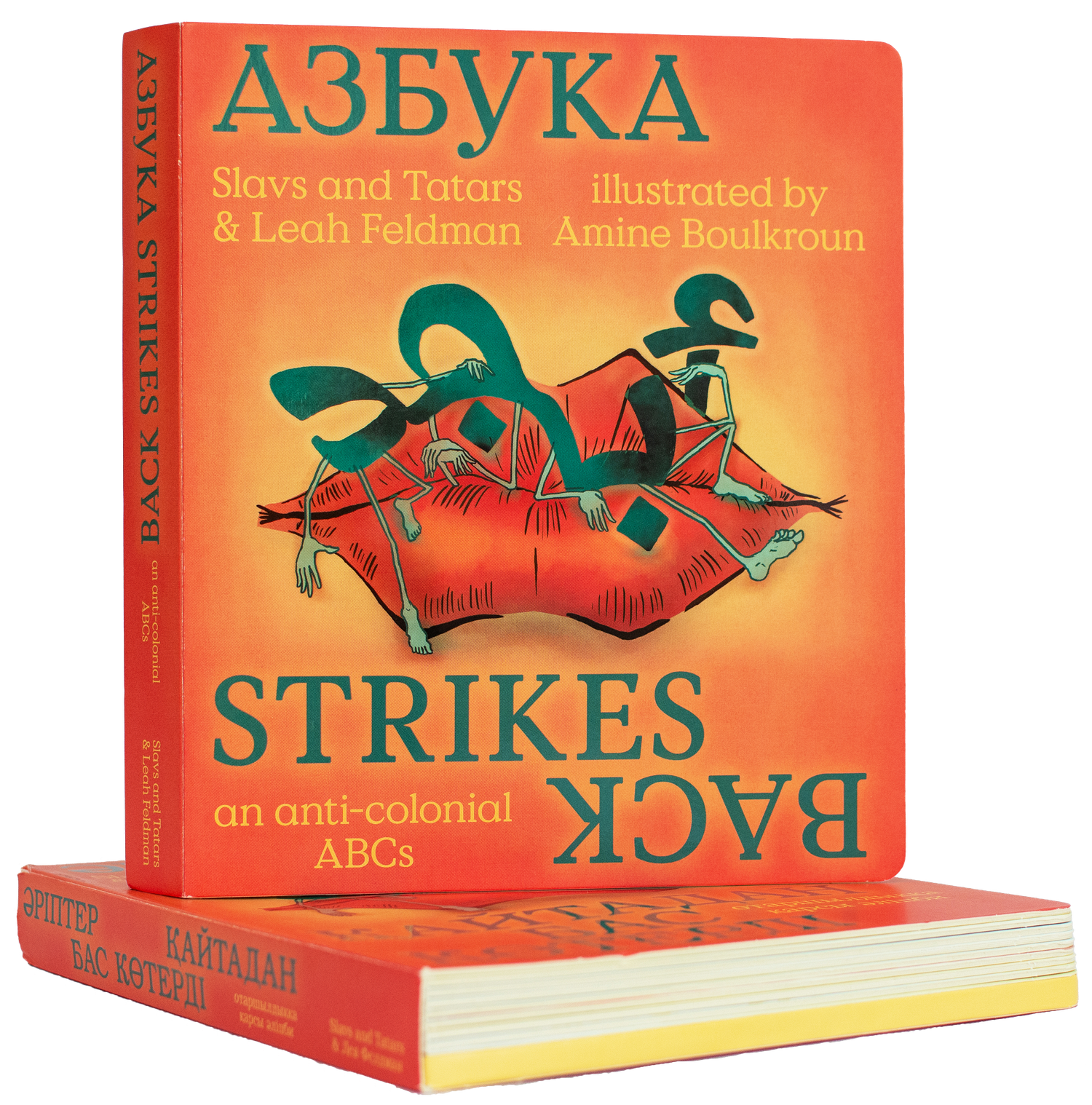Book launch
1227 West 18th Street
Chicago, Illinois 60608
United States
Please join the Gray Center for Arts and Inquiry on Thursday, October 24, at 7pm, at Punch House in Chicago for a special book launch celebration for Azbuka Strikes Back: an Anti-Colonial ABCs by artist collective Slavs and Tatars and UChicago scholar Leah Feldman (illustrated by Amine Boulkroun / published by Walther and Franz Koenig). The event will feature a short conversation with the authors and a live performance by DJ Lutto Lento who mixed the audio for the book’s interactive components.
Free and open to the public! Books will be available for purchase on site through Pilsen Community Books.
Azbuka Strikes Back: an Anti-Colonial ABCs is a mordant look at the constantly changing alphabets of 25 million people in the time of the Soviet Union. This interactive book offers a whirlwind tour of ABCs and anticolonialism in the former Soviet sphere. Azbuka Strikes Back is an artist book for children and adults alike, which takes the universal idea of an alphabet and unpacks it in fun, incisive, and informative ways. This is done to help us better understand where letters come from, why they make certain sounds not to mention their baggage when it comes to gender, race, labor, and empire. With interactive buttons for unusual sounds, the book will help explore areas of pronunciation not commonly found in English. The book is available in two languages: English and Kazakh.
The production and publication of this book extend from the Gray Center Fellowship Transliterative Tease: A Radical Reader, for which Leah Feldman and Slavs and Tatars were the central collaborators.
About the authors
Slavs and Tatars is an internationally renowned art collective devoted to an area east of the former Berlin Wall and west of the Great Wall of China known as Eurasia. Their work has been the subject of solo exhibitions at the Museum of Modern Art, NY; Salt, Istanbul; Vienna Secession, Kunsthalle Zurich, Albertinum in Dresden; Ujazdowski Centre for Contemporary Art Warsaw and the Neubauer Collegium at the University of Chicago, among others. The collective’s practice is based on three activities: exhibitions, publications and lecture-performances. Imbued with humor and a generosity of spirit, their work commonly blends pop visuals with esoteric traditions, and oral rituals with scholarly analysis in a way that opens new paths of contemporary discourse. Slavs and Tatars have published more than ten books to date on the politics of alphabets and transliteration. In 2019, the collective curated the 33rd Ljubljana Biennial of Graphic Arts and their work was included in the main exhibition, “May You Live in Interesting Times,” of the 58th Venice Biennale. The collective launched a residency and mentorship program for young professionals from their region in 2018 and recently opened Pickle Bar, a new project space-cum-slavic apéritivo bar a few doors down from their studio in Berlin’s Moabit district.
Leah Feldman is the 2024–25 Interim Director of the Gray Center and an Associate Professor in Comparative Literature and The College at the University of Chicago. Feldman’s research explores the poetics and the politics of global literary and cultural entanglements, focusing critical approaches to translation theory, semiotics, Marxist aesthetics and decolonial theory, which traverse the Caucasus and Central Asia. Her book On the Threshold of Eurasia: Orientalism and Revolutionary Aesthetics in the Caucasus (Cornell 2018) exposes the ways in which the idea of a revolutionary Eurasia informed the interplay between orientalist and anti-imperial discourses in Russian and Azeri poetry and prose. Tracing translations and intertextual engagements across Russia, the Caucasus and western Europe, it offers an alternative vision of empire, modernity and anti-imperialism from the vantage point of cosmopolitan centers in the Russian Empire and Soviet Union. She is currently writing on the rise of the New Right in late/post-Soviet Eurasia and a book tentatively titled Feeling Collapse on Soviet film, art, and performance from Central Asia and the Caucasus amidst the collapsing sensorium of the Soviet Empire. Her work has appeared in Slavic Review, boundary 2, Ab Imperio, and Global South and she serves on the editorial collective for boundary 2.

